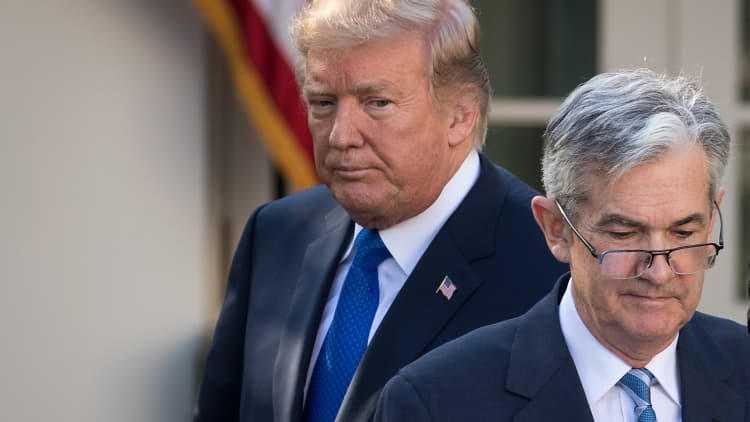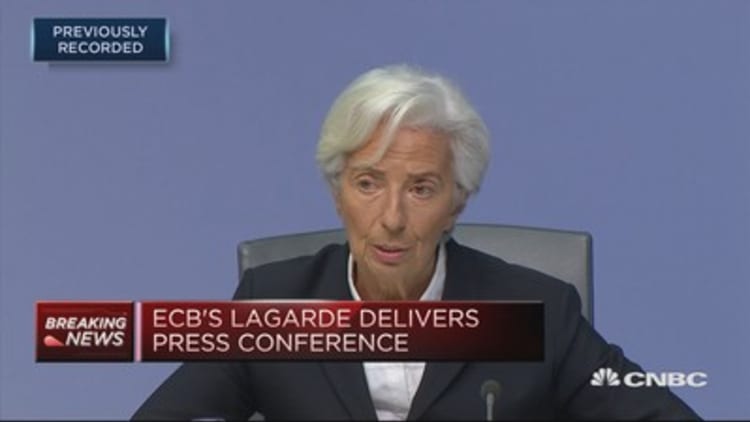Central banks are experiencing a soul-searching moment as they look to strengthen their popularity after the global financial crisis — an exercise that could ultimately change how they operate.
The European Central Bank (ECB) is hosting its first "listening event" in Brussels next month. President Christine Lagarde is set to discuss with European citizens the role of the central bank across the 19-country region. However, the ECB is not the first major central bank to organize such events. The U.S. Federal Reserve announced in late 2018 that it would be reviewing its work, which included several "Fed Listens" events across the country. The results are set to be unveiled in the first half of 2020.
"The ECB is simply imitating the Fed, and both are doing the public consultations because they feel insecure as their instruments seem to have lost 'bite,'" Daniel Gros, the director of the Brussels-based think tank CEPS, told CNBC via email.

Different analysts argue that central banks are conducting these public exercises to receive reassurances on what they do, at a time when many have doubts about the effectiveness of their policy tools.
"Hoping to heal rifts between the ECB and the general public, in some countries, is certainly a big part of the exercise," Florian Hense, an economist at Berenberg bank, told CNBC.
Erik Jones, a professor at the Johns Hopkins University, said "there is a lot of talk about the need for central banks to communicate more transparently … Part of this may be the result of a sense of exposure that central bankers felt when they were 'the only game in town' in the depths of the crisis."
Central banks have changed
The two major central banks have undergone a massive change in the aftermath of the global financial crisis. They were forced to expand their balance sheets and announced unconventional measures to support their respective economies. But the global financial community is now questioning whether both central banks have reached a limit.
The International Monetary Fund said in November that "concerns about the expanded activities of central banks led to skepticism about the necessity or the appropriate degree of central bank independence." At the same time, the general public seems largely unaware about the work conducted by these institutions.
It is hard to imagine that nothing will change at all.Erik JonesProfessor at Johns Hopkins University
The new "communication attitude" is born "from the awareness that, during the crisis and in its aftermath, central banks got to the limits of their powers and responsibilities and they have to show that, while indeed treading new ground, they remain faithful to their main mission," Francesco Papadia, senior resident fellow at the think tank Bruegel, told CNBC.
The ECB's main mandate is to ensure stable prices in the euro zone. The Fed, apart from price stability, also monitors the U.S. labour market. Speaking to the European Parliament last week, ECB President Christine Lagarde said the aim of the public events is to "learn directly from civil society organizations and the people what matters most to them, be that rising rents and house prices, job uncertainty or climate change."
How could monetary policy change?
The question is whether these new communication efforts will ultimately change the way central banks operate. Both the ECB and the Fed might adapt their policies depending on how the public consultation goes.
"If the attempt to reach a wider audience is successful and the wider audience answers this attempt with more convinced support of central banks, we can expect them to continue being bold in pursuing their objective," Papadia from Bruegel said. "If this will not be the case, some kind of timidity could follow."
According to Florian Hense, from Berenberg, the ECB could decide to alter how it calculates prices and, or, adapt its inflation target from "close but below 2%" to a range from 1.5% to 2.5%.
"It is hard to imagine that nothing will change at all," Jones from Johns Hopkins University said while cautioning that it's unlikely that any of the potential changes will be massive.



